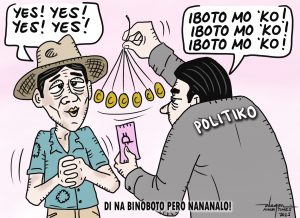BY HERMAN M. LAGON
The Professional Regulation Commission (PRC) has long been a staple of bureaucracy in the Philippines—a stopover for professionals renewing licenses, applying for certifications, or addressing inquiries. Yet, stepping into their office in Gaisano Iloilo City Center in Mandurriao, Iloilo, recently felt less like navigating a labyrinth and more like walking into a streamlined operation. The process took just 15 minutes to renew my civil engineering and teaching licenses. The year before, I had the same seamless experience obtaining my guidance counseling license. Quick service, seamless flow, clear instructions, and professional staff—PRC’s efficiency left me both impressed and reflective.
The inquiries I had were met with a blend of warmth and expertise. You often hear none of that “balik na lang bukas” (come back tomorrow), “wala kita sg mahimo sina” (there is nothing we can do about it), “hindi ko alam” (I don’t know that), or “wala pa diri ang in-charge” (the person in charge is not here yet) rhetorics elsewhere. Instead, the staff listened attentively, offered solutions, and even cracked a smile—a rarity in many government offices. It felt like a small glimpse of what government service could and should be: efficient, respectful, facilitating, and focused on serving the public. Unfortunately, the PRC seems more of an exception than the norm in the broader landscape of our bureaucracy.
In stark contrast, many other government offices still evoke tales of frustration. Remember the typical experience of waiting for hours, only to discover a missing requirement no one told you about beforehand? Or the infamous “balik-balik” routine, where applicants must return multiple times because no one can decide who is responsible for what? Or the all-too-common sight of staff behind the glass with a brusque, entitled, crass, or unapproachable demeanor, as if silently suggesting that a little “extra” or “padrino” might be the key to expediting your request. These inefficiencies are not just minor annoyances; they represent a deeper systemic issue that erodes public trust and fosters dependence on “fixers” who profit from red tape.
This is why the PRC’s efficiency stands out. Their online and onsite processes remind us that good governance does not require groundbreaking innovation—it just takes dedication to do the basics right. In the PRC office, forms are accessible, and the waiting area is clean and decent, with clear signages guiding applicants and the staff to move purposefully. Its online registration is also user-friendly, making it streamlined and convenient. These simple measures create an environment where professionalism thrives. Other government agencies would do better if they followed this example.
Efficient public service is crucial in a country where long lines and red tape often burden ordinary citizens. The Philippine Institute for Development Studies (PIDS) has repeatedly highlighted that improving frontline services can enhance economic productivity and public satisfaction. No less than the “Ease of Doing Business” or ARTA Law demands the same. Yet, the gap between policy intentions and on-the-ground realities often remains wide.
This is not to say the PRC is perfect—no system is. But they have shown that improvement is possible even within the constraints of government budgets and regulations. Their success is a testament to how leadership and accountability can elevate the quality of public service. It starkly contrasts the prevalent “pwede na” (good enough) mentality that often bogs down progress and only invites mediocrity.
Take, for example, a public high school teacher from a far-flung barrio in the countryside trying to renew her license to meet a professional development requirement. If the process is tedious and requires multiple days off from work, it disrupts her responsibilities to her students. On the other hand, a seamless experience like mine at the PRC enables her to return to her duties promptly, with less stress and intact self-respect. Efficiency does not just benefit individuals; it strengthens entire systems.
Reflecting on the PRC experience, I could not help but think about the broader implications. What if more government offices embraced the same level of professionalism? What if public servants across agencies were trained to approach their roles with the same respect for people’s time and dignity? Imagine the ripple effect on national morale and productivity. It is not far-fetched; a number of offices might already be doing the same, even better. Everything is just a matter of commitment and consistent execution.
Critics might argue that highlighting the PRC’s excellence sets an unfair benchmark, given that each agency has unique challenges. But excellence does not require identical outcomes—it requires effectively meeting the people’s needs. Whether it is issuing licenses, processing permits, logging in reports, writing notices, providing advice, injecting vaccines, submitting pleas, resolving disputes, offering assistance, or giving a warm welcome, every agency has the potential to redefine how we all perceive public service. The PRC is proof of that.
As I walked out of the PRC, holding my renewed license and reflecting on the smooth experience, I felt something rare: pride. Not just in the PRC staff who clearly take their roles seriously, but in the idea that government can work. It is time we demand more from other agencies—not out of cynicism, but because the PRC has shown us it is possible.
***
Doc H fondly describes himself as a “student of and for life” who, like many others, aspires to a life-giving and why-driven world grounded in social justice and the pursuit of happiness. His views do not necessarily reflect those of the institutions he is employed or connected with.


